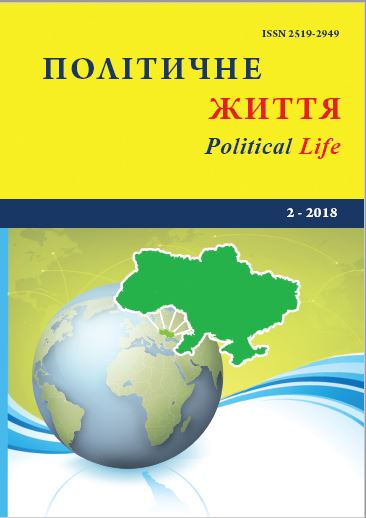Communicative Model of Moldovan Language Policy.
DOI:
https://doi.org/10.31558/2519-2949.2018.2.16Keywords:
Moldova, language policy, Romania, communicative politics, Russia, separatism, Transnistria, UkraineAbstract
The article analyzes the communicative model of the language policy of Moldova as such, which, when implemented by its central authority of this state and by separate political forces, resembles that linguistic policy conducted in Ukraine during all years of independence. It is proved that in the language policy of Moldova, as well as in the language policy of Ukraine, all the years of independence are actively interfered by Russia, using for this purpose the internal pro-Russian-minded political forces of the state. It was established that the basis of political confrontations that arose in Moldova was the language-political problem, which divided the Moldovan community into at least three groups – Russian-speaking, Ukrainianlanguage, and Moldovan. It is substantiated that pro-Romanian and pro-Russian political ambitions on the territory of Moldova formed the basis of Romanian and Russian separatisms, each of which saw this state within its own political influence. It is proved that the linguistic-political confrontation on the territory of Moldova turned into a frozen conflict, the separatist center of which was Transnistria. On the other hand, the author draws attention to the fact that the communicative model of the language policy of Moldova is closely linked with Romania. It develops in the context of two opposing socio-political tendencies: one of them is the "Moldovans" who advocate the revival of the national language, culture and traditions, the other – "Romanians" – the Moldovan ethnos of Romanian origin, whose efforts are aimed at the revival of Greater Romania and joining this state of Moldova. In this context, the same analogy is observed in Ukraine, which has evolved since the mid-1990s in the context of two opposing socio-political tendencies: one of them is pro-Russian political forces that stand for the status quo for the Russian language and culture, the other is the national democrats, whose efforts are aimed at preserving the Ukrainian language and its dissemination in all spheres and regions of the state.References
Дирун А. Динаміка суспільно-політичного розвитку республіки Молдова в контексті етнополітичного конфлікту: Автореф. дис. ... канд. політ. наук: 23. 00. 02 / Одеська національна юридична академія. – Одеса, 2005. – 17с.
Мовна ситуація в Україні: між конфліктом і консенсусом. – К.: ІПіЕНД імені І. Ф. Кураса НАН України, 2008. – 398 с.
Дербишайр Дж., Дербишайр Я. Політичні системи світу: У 2-х т. Том 1: Пер. з англ. – М.: РИПОЛ КЛАССИК, 2004. – 512 с.
Караткевич О. Системний діалог як технологія оптимізації політичної взаємодії в перехідних суспільствах // Альманах сучасної науки та освіти. − Тамбов: Грамота, 2013. – № 2 (28): у 2-х ч. − Ч. II. − C. 65-67.
Ломака І. Політологічний аналіз інтеґраційної ролі релігії в умовах модернізації українського суспільства: Автореф. дис....канд. політ. наук: 23.00.02 / Львівський національний університет імені Івана Франка. – Львів, 2006. – 20 с.
Коцур В. Етнополітичний конфлікт у Придністров’ї: українсько-молдавські взаємини в гуманітарній сфері // Наукові записки. – К.: ІПІЕНД ім. І. Ф. Кураса, листопад-грудень 2011/6 (56). – С. 421-431.
Слющинський Б. Міжетнічна культурна комунікація в українському Приазов’ї в контексті побудови громадянського суспільства // Сучасна українська політика. Політики і політологи про неї. – К., 2007. – Вип. 10. – С. 406-416.
Костюк М. Мовні війни: західні політичні технології // Вісник Московського університету. – Москва, 2009. – № 4. – С. 93-100.
Дзюба І. Нагнітання мороку: Від чорносотенців початку XX століття до українофобів початку століття XXI. – К.: Вид. Дім «Києво-Могилянська академія», 2011. – 503 с.
Ciscel M. (2008). Uneasy compromise: Language and education in Moldova [Text] / M. Ciscel // International Journal of Bilingual Education and Bilingualism. – 2008. – Vol. 11. – P. 373 – 395.
Вітман К. Мовна політика Молдови – заручник геополітики // Трибуна. – Київ, 2009. – № 3-4. – С. 37-39.
Клинченко Т. Мовно-культурний розвиток в Україні: політичні відносини і культурні реалії // Національна інтеграція у полікультурному суспільстві: український досвід 1991-2000 років / Збірник. Відпов ред. І. Ф. Курас, О. М. Майборода. – Київ: Інститут політичних і етнонаціональних досліджень НАН України, 2002. – С. 215-238.

